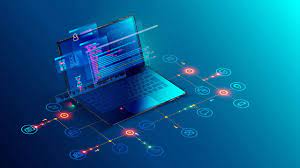The Predictions for Technology Development And Adoption
Exploring the key areas where predictions for technology development is poised to make significant strides.

In the predictions for technology development age where technology is advancing at an unprecedented rate, it's crucial to stay ahead of the curve when it comes to understanding the future trends and predictions for technology development and adoption.
The world of technology is continually evolving, reshaping the way we live, work, and interact with the world around us. In this blog post, we'll explore the exciting developments that lie ahead on the technological horizon, from artificial intelligence to renewable energy, and how these innovations will impact our lives.
The Acceleration of Artificial Intelligence (AI)
One of the most significant and transformative trends in technology is the rapid advancement of artificial intelligence (AI). AI is not a new concept, but recent developments in machine learning, deep learning, and neural networks have propelled it into new realms. In the coming years, we can expect AI to become increasingly integrated into various aspects of our lives.
1. AI in Healthcare:
- AI-powered diagnostic tools and algorithms will revolutionize the healthcare industry. Doctors will be able to make more accurate diagnoses, predict disease outbreaks, and personalize treatment plans based on an individual's genetic makeup.
- Surgical robots will become more sophisticated, leading to less invasive procedures and faster recovery times.
2. AI in Transportation:
- Self-driving cars will become commonplace, enhancing road safety and reducing traffic congestion.
- AI-powered traffic management systems will optimize traffic flow in real-time, reducing travel times and carbon emissions.
3. AI in Finance:
- AI will play a crucial role in fraud detection, risk assessment, and algorithmic trading, making financial markets more efficient and secure.
- Personalized financial advice and wealth management powered by AI will become more accessible.
4. AI in Customer Service:
- Chatbots and virtual assistants will continue to improve, providing more natural and helpful interactions with customers.
- AI-driven personalization will enhance the customer experience across various industries.
The Internet of Things (IoT) and Smart Cities
The Internet of Things (IoT) is another area that will see significant growth in the coming years. IoT refers to the interconnectedness of everyday objects and devices through the internet, allowing them to collect and exchange data. This technology has already begun to reshape our cities and homes.
1. Smart Cities:
- Cities will become more efficient and sustainable as IoT sensors monitor and manage traffic, energy usage, waste disposal, and public services in real-time.
- Improved urban planning will lead to reduced pollution and enhanced quality of life for city dwellers.
2. Smart Homes:
- IoT devices will continue to proliferate within our homes, providing greater convenience and energy efficiency.
- Voice-activated assistants will serve as central hubs for controlling smart devices, making our lives more interconnected and streamlined.
Renewable Energy and Sustainable Technology
The urgent need to address climate change has fueled innovation in renewable energy and sustainable technology. As we move forward, these trends will play a pivotal role in shaping a greener and more sustainable future.
1. Solar Power and Energy Storage:
- Solar power generation will become more affordable and efficient, allowing more households and businesses to transition to renewable energy sources.
- Advancements in energy storage technology will help overcome the intermittent nature of renewable energy, ensuring a constant power supply.
2. Electric Vehicles (EVs):
- The adoption of electric vehicles will continue to rise, driven by improved battery technology, increased charging infrastructure, and government incentives.
- EVs will play a significant role in reducing greenhouse gas emissions and air pollution.
3. Circular Economy and Sustainable Materials:
- Businesses and consumers will increasingly prioritize sustainability, leading to the development of eco-friendly products and practices.
- The concept of a circular economy, where products are designed to be reused and recycled, will gain momentum.
5G and Beyond predictions for technology development
The rollout of 5G networks has already begun, promising faster and more reliable wireless communication. However, the future holds even more exciting prospects in the realm of connectivity.
1. 6G and Beyond:
- Researchers are already exploring the possibilities of 6G, which could offer unprecedented data speeds and connectivity.
- This will enable technologies we can only dream of today, such as instant holographic communication and augmented reality experiences.
2. Edge Computing:
- Edge computing, which processes data closer to the source rather than in centralized data centers, will become more prevalent.
- This will reduce latency and enable real-time processing for applications like autonomous vehicles and IoT devices.
Ethical and Regulatory Challenges
While these technological advancements hold tremendous promise, they also come with ethical and regulatory challenges that need to be addressed. As technology continues to shape our lives, it's essential to consider the following:
1. Privacy Concerns:
- The collection of vast amounts of data raises concerns about individual privacy and data security.
- Striking a balance between data-driven innovation and protecting personal information will be an ongoing challenge.
2. Ethical AI:
- As AI becomes more autonomous, questions about its decision-making and ethical behavior will arise.
- Establishing guidelines and regulations for AI ethics will be crucial.
3. Environmental Impact:
- The production and disposal of electronic devices contribute to electronic waste and carbon emissions.
- Sustainable practices and regulations must be implemented to mitigate these effects.
The Role of Predictions for technology development
To thrive in this ever-evolving technological landscape, individuals and organizations must prioritize education and adaptability. Lifelong learning will become the norm as new skills and knowledge become essential for the workforce of the future. Governments, businesses, and educational institutions will need to collaborate to ensure that people have access to the training and resources they need to stay relevant in a tech-driven world.
The future of technology promises incredible advancements that will transform the way we live, work, and interact with the world around us. From the proliferation of AI and IoT to the rise of renewable energy and the continued evolution of connectivity, these trends will shape the landscape of the coming years.
However, it's essential to approach these developments with a thoughtful and ethical mindset. As technology becomes increasingly integrated into our lives, we must address privacy concerns, ethical dilemmas, and environmental impacts. By doing so, we can harness the full potential of technology while ensuring a more sustainable and equitable future for all.
In the end, the future of technology is not predetermined; it is shaped by the decisions we make today. As individuals and as a society, we have the power to influence how technology evolves and how it benefits us and future generations. It's an exciting journey into the unknown, and by staying informed and engaged, we can all be active participants in shaping the future of technology.
What's Your Reaction?















